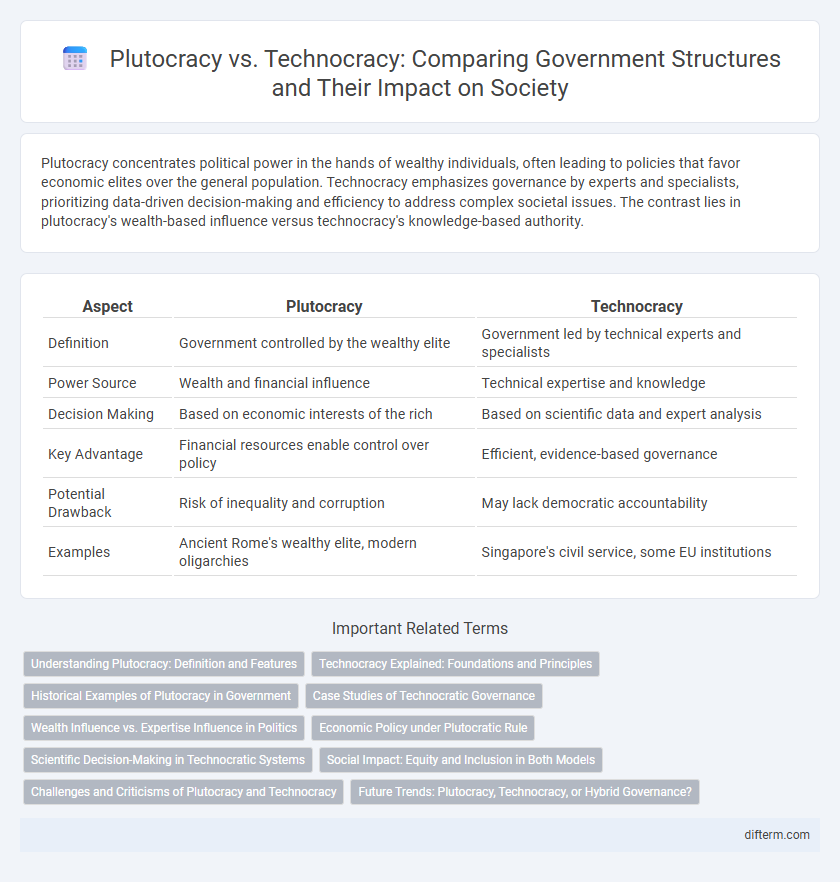Plutocracy concentrates political power in the hands of wealthy individuals, often leading to policies that favor economic elites over the general population. Technocracy emphasizes governance by experts and specialists, prioritizing data-driven decision-making and efficiency to address complex societal issues. The contrast lies in plutocracy's wealth-based influence versus technocracy's knowledge-based authority.
Table of Comparison
| Aspect | Plutocracy | Technocracy |
|---|---|---|
| Definition | Government controlled by the wealthy elite | Government led by technical experts and specialists |
| Power Source | Wealth and financial influence | Technical expertise and knowledge |
| Decision Making | Based on economic interests of the rich | Based on scientific data and expert analysis |
| Key Advantage | Financial resources enable control over policy | Efficient, evidence-based governance |
| Potential Drawback | Risk of inequality and corruption | May lack democratic accountability |
| Examples | Ancient Rome's wealthy elite, modern oligarchies | Singapore's civil service, some EU institutions |
Understanding Plutocracy: Definition and Features
Plutocracy is a form of government where wealth dictates political power, enabling the richest individuals or families to influence policy and decision-making. Key features include economic elitism, limited political representation for the broader population, and policies favoring the interests of the wealthy class. Understanding plutocracy involves examining its impact on social inequality, governance transparency, and democratic principles.
Technocracy Explained: Foundations and Principles
Technocracy is a system of governance where decision-makers are selected based on their expertise in science, technology, and engineering rather than political affiliations or wealth. This model emphasizes evidence-based policy-making, efficiency, and the application of technical knowledge to solve complex societal problems. Foundational principles include meritocracy, rational administration, and the prioritization of technological progress to enhance public welfare.
Historical Examples of Plutocracy in Government
Historical examples of plutocracy in government include ancient Rome, where wealthy elites controlled political power through their wealth and social status. During the Gilded Age in the United States, industrial magnates like Andrew Carnegie and John D. Rockefeller exerted significant influence over legislation and policy. Modern critiques often cite Russia's oligarchic system as a contemporary form of plutocracy, where wealth concentration impacts government decisions.
Case Studies of Technocratic Governance
Singapore exemplifies technocratic governance, where policy decisions are guided by expertise in economics, urban planning, and public administration, resulting in sustained economic growth and efficient public services. In contrast, historical plutocracies like the late Roman Republic show how wealth concentration can undermine political stability and equitable governance. The success of technocracies often hinges on meritocratic recruitment and data-driven policy-making, fostering transparency and long-term development.
Wealth Influence vs. Expertise Influence in Politics
Plutocracy concentrates political power in the hands of the wealthy, where financial resources drive policy decisions and political influence, often prioritizing economic interests over public welfare. Technocracy emphasizes governance by experts and specialists, relying on knowledge, data, and technical skills to shape policies aimed at efficiency and evidence-based outcomes. Wealth influence in plutocracy risks deepening inequality and undermining democratic ideals, while expertise influence in technocracy seeks to optimize societal progress through informed decision-making.
Economic Policy under Plutocratic Rule
Economic policy under plutocratic rule prioritizes the interests of wealthy elites, often resulting in tax structures favoring capital gains and corporate profits. Public spending tends to concentrate on initiatives that enhance wealth accumulation, such as deregulation of financial markets and subsidies for large corporations. This approach typically exacerbates income inequality and limits social welfare programs designed to support broader economic growth.
Scientific Decision-Making in Technocratic Systems
Technocratic systems prioritize scientific decision-making by relying on experts and data-driven analysis to formulate policies, ensuring that governance is based on empirical evidence rather than wealth or political influence. Plutocracy, in contrast, often decentralizes power to wealthy elites whose decisions may prioritize financial interests over scientific validity and public welfare. The emphasis on expertise and objective knowledge in technocracies aims to optimize societal outcomes through informed and rational policy interventions.
Social Impact: Equity and Inclusion in Both Models
Plutocracy often exacerbates social inequality by concentrating power and wealth among a privileged elite, limiting equitable access to resources and opportunities for marginalized groups. Technocracy aims to promote inclusion through data-driven policies and expertise, yet it risks perpetuating exclusion if decision-making lacks diverse representation. Evaluating social impact requires balancing technocratic efficiency with mechanisms ensuring broad participation and equitable resource distribution.
Challenges and Criticisms of Plutocracy and Technocracy
Plutocracy faces criticism for concentrating wealth and power in the hands of a few, leading to economic inequality and diminished political representation for the majority. Technocracy is challenged by concerns over bureaucratic elitism, lack of democratic accountability, and potential disconnect between technical experts and public needs. Both systems struggle with legitimacy issues and balancing efficient governance with inclusive participation.
Future Trends: Plutocracy, Technocracy, or Hybrid Governance?
Emerging governance models indicate a shift towards hybrid systems combining plutocracy's capital-driven influence with technocracy's data-driven decision-making, optimizing both economic power and expertise. Advanced AI integration and increased public demand for transparency are accelerating technocratic elements in policy formulation, while persistent wealth inequality sustains plutocratic tendencies. Future governance will likely balance resource control and technical competence to address complex global challenges effectively.
Plutocracy vs Technocracy Infographic

 difterm.com
difterm.com